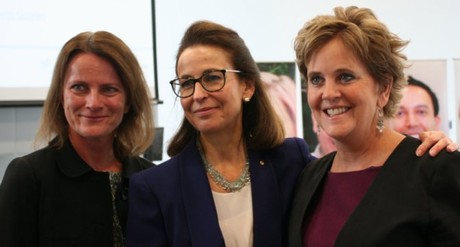The case for gender equality in IT is clear

Ideas for furthering equality in government were shared at the ‘Women in Leadership’ symposium.
Is gender equality still an issue for women in Australia? According to Virginia Haussegger AM, Director of the 50/50 by 2030 Foundation, there is no doubt about it. In her opening remarks at Public Sector Network’s recent ‘Women in Leadership’ symposium, she stressed the need to keep pushing for change.
“We tend to think that Australia is doing ok, but in fact, we are still facing major problems with gender equality. Comparing ourselves to the rest of the world should set off the alarm bells,” she said.
The keynote speaker, Her Excellency Menna Rawlings, British High Commissioner, acknowledged the progress to date, but was equally unequivocal about the need to keep demanding more. With a firm focus on practical steps for moving forward, she noted the importance of creating policies that support women, breaking down the hierarchical cultures that still exist in many public sector organisations in both Australia and the UK, and sharing both the joys and the burdens of parenthood equally.
In terms of institutional measures, her stance was clear. “Targets are an absolutely minimum, because what gets measured, gets done,” Rawlings said.
However, she also recognised her own role in improving the situation. “As leaders, we really need to challenge ourselves and ask, what can we do to remove some of those barriers,” she added.
After such a stellar start to the day, the audience was busting for more, and the ‘One on one’ conversation with Her Excellency Unni Kløvstad, Norwegian Ambassador, and Virginia Haussegger AM did not disappoint.
A global leader for gender equality, the key question for the discussion was ‘How has Norway done it?’
Norway’s successes in promoting diversity, as it turns out, are no accident. Since the 1970s, Norwegian governments have implemented policies to promote female participation in the workforce by providing generous paid parental leave and affordable child care. Gender diversity is also seen as crucial for sound government.
“By the late 80s, early 90s, it was almost impossible for political parties to not nominate 50% women. It was simply considered bad practice,” Kløvstad said.
When asked about how they got to that point, Kløvstad pointed to the different societal norms. “We have this tradition of both expecting and accepting a higher degree of government intervention in order to steer development. And in this case it was obvious that we wanted a more gender-equal society.”
Such cultural expectations also helped with the implementation of quotas, which have been instrumental in bringing about the rapid change. “In 2003 before the quota law, women comprised 7% of publicly listed and publicly owned companies. Now it’s above 40%.”
When Haussegger recounted some of the recent media commentary in Australia, which had argued that diversity quotas elevate women to positions they are not qualified for, and thus lead to corporate failures, Kløvstad was quick to point out that based on their experiences, nothing could be further from the truth.
“We have seen that the boards now function better than before, they make better decisions than before. And the reason for that is that women tend to be better prepared. They read the documents before the meetings, and they ask more critical questions,” she said. “And consequently the men started doing the same. The business case is clear. Having more women on boards leads to better results. It also raises the calibre of men.”
Please follow us and share on Twitter and Facebook. You can also subscribe for FREE to our weekly newsletter and quarterly magazine.
Originally published here.
Safe networking can fuel public transport uptake
State transport will play a big role in supporting the recovery of Australian city functions once...
Time for government IT to stop acting like a cost centre
Many government IT organisations are still perceived purely as cost centres, putting them at the...
Address verification tech boosts government efficiency
Address verification technology from Geoscape has helped the ACT Government reduce costs and...




